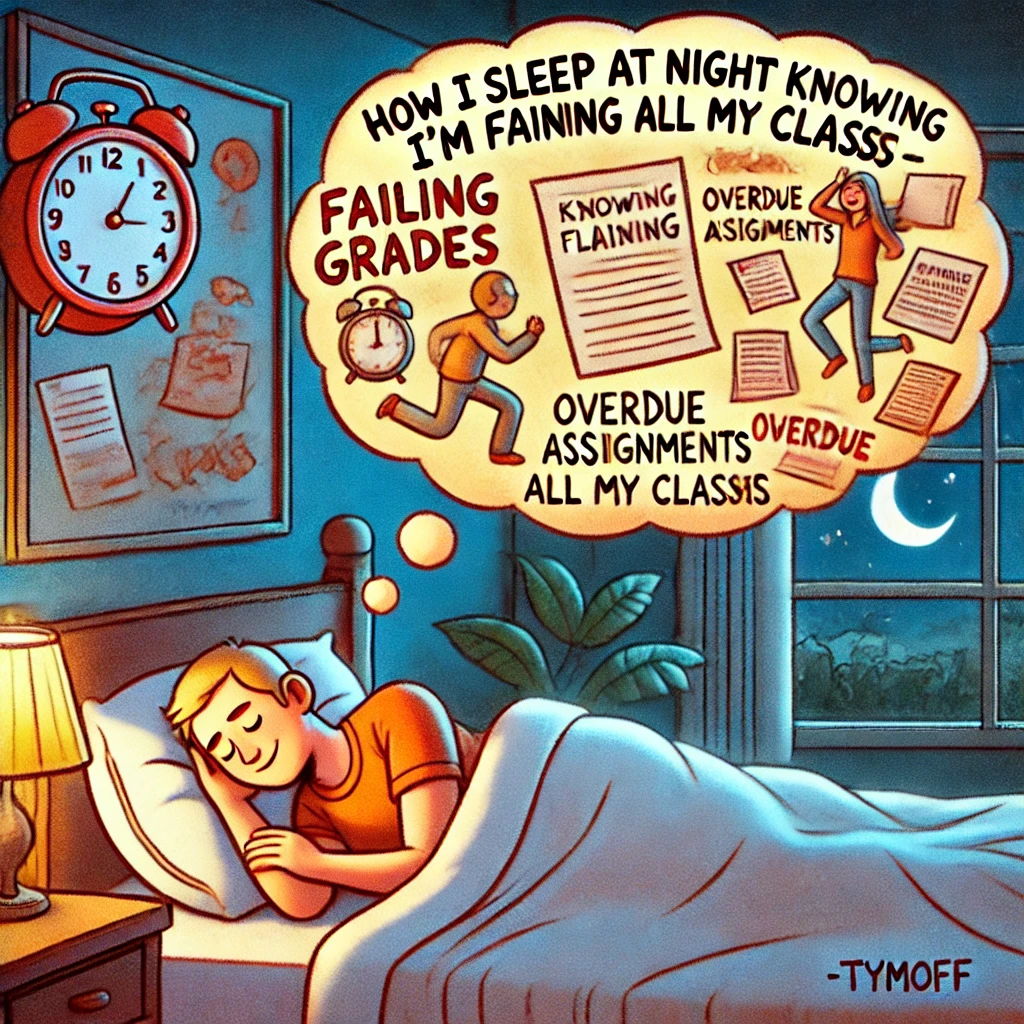Introduction
Failing academic classes can be a challenging experience, filled with stress, self-doubt, and societal pressure. The question of “how I sleep at night knowing I’m failing all my classes” might seem ironic or even impossible to answer for some, yet it holds deeper meanings about coping mechanisms, resilience, and mental health. In this article, we will explore various aspects of this topic, addressing how students reconcile with academic failure, manage their mental health, and work towards improvement without succumbing to despair.
Understanding Academic Failure
Failure in academics is often stigmatized, with students feeling immense pressure to succeed at all costs. The competitive environment in schools and colleges amplifies these pressures, making failure seem catastrophic. However, it is essential to understand that failure is a part of the learning process. It provides opportunities to reassess strategies, identify weaknesses, and develop a growth mindset.
Failing multiple classes can feel overwhelming, but it does not define a person’s worth or potential. It is crucial to separate the idea of academic failure from personal failure. Recognizing this distinction is the first step toward sleeping peacefully despite academic setbacks.
The Emotional Toll of Failing
Failing classes can evoke a mix of emotions, including guilt, shame, anxiety, and frustration. These feelings are natural and often stem from societal expectations, parental pressure, and personal aspirations. The fear of being judged or labeled as a failure can exacerbate these emotions, leading to sleepless nights and a cycle of self-blame.
Acknowledging these emotions is vital for managing them. Bottling up feelings can lead to further mental health issues, such as depression or burnout. Speaking openly about academic struggles with trusted friends, family members, or counselors can help alleviate the burden.
Coping Mechanisms for Better Sleep
When facing academic failure, finding ways to sleep peacefully becomes a priority. Sleep is essential for mental and physical well-being, and disrupted sleep can worsen the situation. Below are some effective coping mechanisms:
1. Acceptance
The first step toward sleeping better is accepting the reality of the situation. Denial or avoidance only prolongs stress. By acknowledging that failure has occurred, students can focus on actionable steps to improve their circumstances. Acceptance does not mean giving up; it means recognizing the current state as a starting point for growth.
2. Mindfulness and Relaxation Techniques
Mindfulness practices, such as meditation and deep-breathing exercises, can calm the mind and prepare the body for restful sleep. Progressive muscle relaxation, visualization, and yoga are also effective in reducing stress and promoting relaxation.
3. Setting Realistic Goals
Failing multiple classes can make the road to recovery seem insurmountable. Breaking down tasks into smaller, manageable goals can create a sense of accomplishment and motivation. For example, focusing on improving performance in one class at a time is more achievable than trying to fix everything at once.
4. Establishing a Sleep Routine
Maintaining a consistent sleep schedule helps regulate the body’s internal clock. Going to bed and waking up at the same time each day, even on weekends, can improve sleep quality. Avoiding caffeine, heavy meals, and screen time before bed also contributes to better sleep hygiene.
5. Seeking Professional Help
Sometimes, the stress of academic failure can become overwhelming, making it difficult to cope alone. In such cases, seeking help from a therapist or counselor can provide valuable guidance and support. Mental health professionals can offer strategies to manage stress, build resilience, and develop a positive outlook.
Shifting Perspectives on Failure
One of the most critical aspects of coping with academic failure is reframing it as a learning experience. Instead of dwelling on what went wrong, students can ask themselves what they can learn from the situation. This shift in perspective fosters a growth mindset, which emphasizes effort, learning, and perseverance over innate ability.
Inspirational stories of successful individuals who faced academic setbacks but went on to achieve greatness abound. For instance, Albert Einstein struggled in school but became one of the most influential scientists in history. Such examples remind us that failure is not the end but a stepping stone toward success.
Building a Support System
A strong support system can make a significant difference in how students cope with failure. Friends, family, mentors, and peers can provide encouragement, advice, and emotional support. Sharing struggles with others helps lighten the burden and creates a sense of belonging.
Educational institutions also play a crucial role in supporting students. Academic advisors, tutors, and professors can offer guidance and resources to help students get back on track. Seeking help is not a sign of weakness but a proactive step toward improvement.
The Role of Self-Compassion
Practicing self-compassion is essential for sleeping well despite academic failure. Being kind to oneself and recognizing that everyone makes mistakes can reduce self-criticism and promote emotional well-being. Instead of berating themselves for failing, students can focus on what they are doing to improve.
Self-compassion also involves prioritizing self-care. Eating a balanced diet, exercising regularly, and engaging in hobbies or activities that bring joy can help students recharge and maintain a positive outlook.
Strategies for Academic Recovery
While coping mechanisms are vital for mental health, taking actionable steps to address academic issues is equally important. Here are some strategies for academic recovery:
1. Identifying the Root Cause
Understanding why failure occurred is crucial for preventing it in the future. Was it due to a lack of understanding, poor time management, or external factors? Identifying the root cause allows students to develop targeted solutions.
2. Creating a Study Plan
A well-structured study plan helps students stay organized and focused. Allocating specific times for studying, taking breaks, and reviewing material ensures a balanced approach to learning.
3. Utilizing Academic Resources
Many schools and colleges offer resources such as tutoring, study groups, and workshops. Taking advantage of these resources can provide additional support and improve understanding of challenging subjects.
4. Developing Time Management Skills
Effective time management is a critical skill for academic success. Prioritizing tasks, avoiding procrastination, and using tools such as planners or apps can help students manage their time efficiently.
5. Staying Persistent
Recovery from academic failure is a gradual process that requires persistence and patience. Celebrating small victories along the way can boost motivation and reinforce a positive mindset.
Conclusion
Sleeping peacefully at night while facing academic failure may seem challenging, but it is possible with the right mindset and strategies. Acceptance, mindfulness, self-compassion, and actionable steps toward improvement are key components of this process. Failure is not the end but an opportunity for growth and resilience.
The phrase “how I sleep at night knowing I’m failing all my classes” might initially appear to reflect hopelessness, but it ultimately highlights the strength required to face challenges head-on. By focusing on self-improvement and seeking support, students can turn setbacks into stepping stones for future success.



